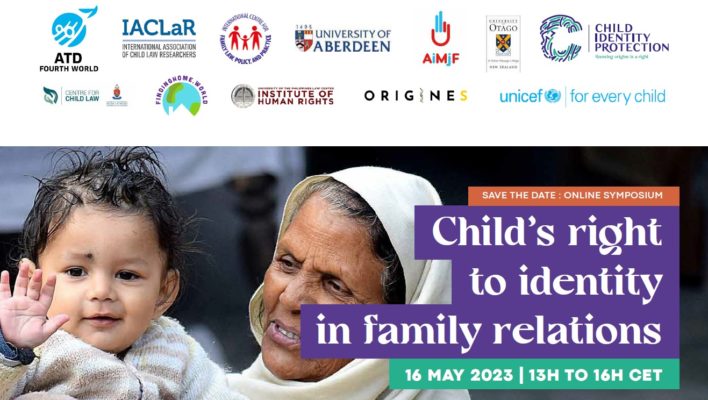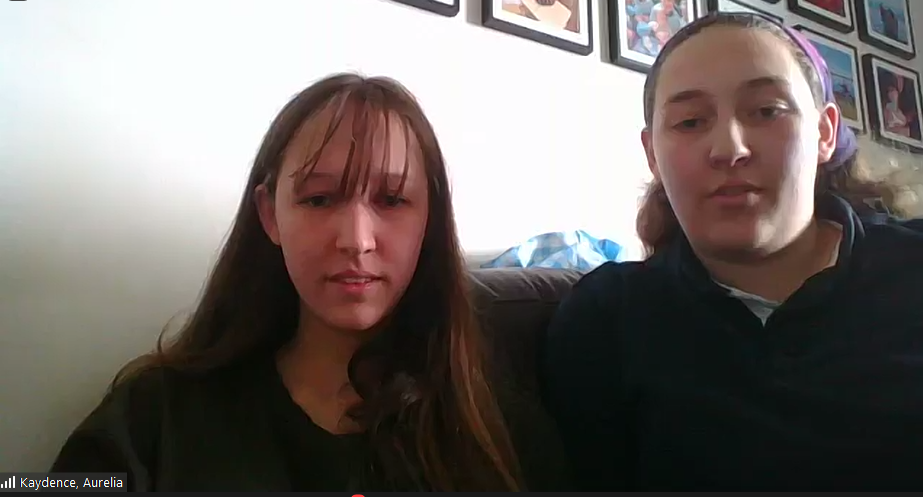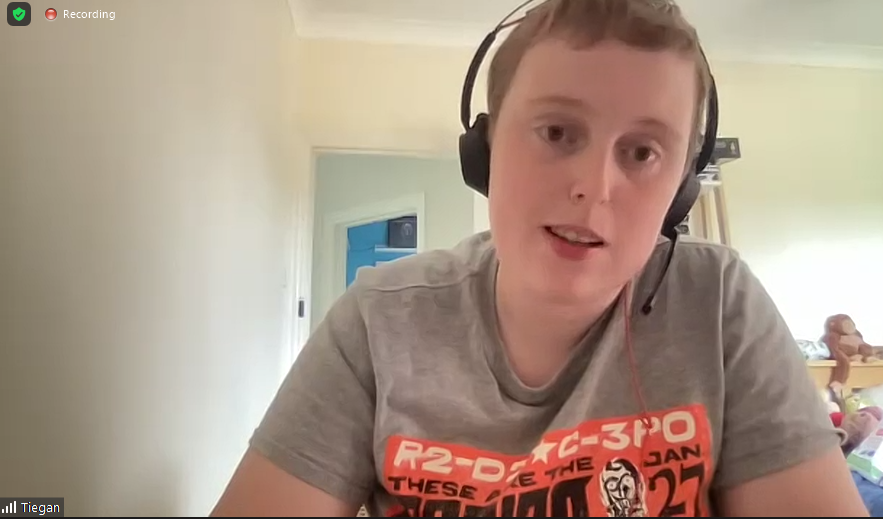Stolen identities: The devastating impact of social work services on the identity of children in poverty

On the 16th of May, Youth Voices, a project run by ATD Fourth World and Teen Advocacy, were invited to talk at the “Child’s right to identity in family relations” symposium, organised by Child Identity Protection. Among a wide variety of speakers from institutions like UNICEF and Aberdeen University, the Youth Voices speakers – Aurelia Drayak, Kaydence Drayak and Tiegan Boyens – were both the only young people and also the only ones with lived experience of social care interventions in their families. To learn more about the symposium, and to watch the video recording, please click here (minute 46).
The title of the Youth Voices presentation was “Stolen identities – The devastating impact social work services has on the identity of children living in poverty in the UK”. They touched upon important topics such as the right to heritage, sibling relations, and the harsh social service investigations that families in poverty have to undergo. Keep reading for the full transcript of their talk.
Kaydence Drayak:
Hello, my name is Kaydence. Aurelia, Tiegan and I are part of the Youth Voices project where we have been speaking to young people who have experienced poverty and been impacted by social services. We put their views together for a submission to the Social, Cultural, Economic Rights Committee for their review of the UK. Our first submission was sent to them in December last year and we are working on our second submission, which is due next year. We are going to talk about the impact the care system has on a child’s identity; but I first wanted to talk about why in particular we are looking at young people who have been impacted by poverty.
We know that if you are in poverty you are much more likely to be removed from your family. They call it negligence because maybe you went to school in dirty clothes. What everyone sees is a mother who didn’t wash them. What they don’t see is that the mother hand washed their clothes because the washing machine broke and they can’t afford to buy a new one. Instead she made sure there was dinner for the next month. Poverty is not negligence from a family; it is negligence by the state refusing to support and help families, which they then punish by tearing the families apart, saying it is for our own good.
Anyone who loved that child is forgotten and condemned. It is known and recognized that a child removed is a child broken. But it’s not just one child. It’s a broken family. They will grieve for a child that has not died; and if they survive they will never stop hurting for them, they will never stop hoping for them and they will never forget that piece of their heart.

Aurelia Drayak:
When we ask ourselves, who am I?, we often relate that to other people. I’m a sister, I’m a carer, I’m a daughter, I’m a friend. When children are stolen, we don’t just take their family and friends from them; we take themselves away from them. I am not me without these pieces of my identity. I am not me if I’m not a sister, or a carer, or a friend. The cruelty of leaving a child with nothing but a hollow shell of who they were is indescribable. The damage this does and the trauma it inflicts is irreversible and something that stays with you forever.
A social worker will take your family, they will take away your home, and they will take away your love. But a social worker will take even yourself from you. There is nothing not stolen when a child is taken away.
Something so often overlooked is siblings. We know a child’s mother is important, we even know a child’s grandfather is important. But siblings are cast aside and pushed away, because so often we are children too and that means we don’t matter. It means we don’t count and it means we don’t get to be proper people. My siblings are some of the most important people in the world to me and yet no one cares what I have to say about them; no one cares what they have to say about me. Because siblings don’t matter in the real world, not to anyone but each other, but no one will listen to us. Siblings are punished and separated and broken because an adult made a mistake. Because something went wrong, no one cares that it’s not their fault. No one looks out for them. Siblings should never be separated, not unless they’re hurting each other. I do not believe that the current system cares about the best interest of the child, because siblings are still separated and that’s not okay. It’s not our fault that all of you adults can’t get along.
Tiegan Boyens:
Hello, I am Tiegan. I am a 21-year-old adoptee who was adopted at the age of 4 after two years in care. There have been many positives of my story, including the gaining of identity through my journey and even losing parts that I am honestly quite happy I have lost. However there are parts of my identity that I wish I still had and parts that in some ways I have had to fight to keep or have accepted by others. This has been challenging for me and doesn’t feel fair in most cases as, yes, they have been stolen.
The first is the fact that I am a sibling. But my entire life, by most perspectives or under the eyes of the law I am not, at least in the same capacity as when I was with my birth family. I grew up as an only child which suited me; however I was always very conscious that I wasn’t an only child. It frustrated me when people called me an only child, as I felt my sisters were being ignored and my role as a sibling was also being ignored. I grew to accept it to some degree but never fully when I can. I distinguish that I grew up as an only child to show that difference. I have always heard people talk about middle children, the jokes and such. I always listened but thought they were not relevant to me. However it recently dawned upon me that I am a middle child.
This shouldn’t be the case, this should have been an identity I knew about as soon as my younger sisters were born. I hope to build some connection and relationship with my sisters over time, however I know it won’t be the same as if we had grown up together. We have all been through our own challenges as well as our own lives. I will never truly be their sister and we will never truly have that sister identity, especially to others.
The other way is my Irish heritage. I have been super lucky that my adoptive parents have always been supportive that I have Irish heritage, promoting that fact whenever possible and felt right. They did this from the beginning, despite people telling them they didn’t have to. I remember the census in 2011 that my mums asked what I wanted to be put down as my ethnicity. This was great, but my adoptive parents are only one part of my life. I had my birth right to Irish citizenship taken away from me as soon as I was adopted.
Others associate me with my adoptive parents’ heritage just assuming I am the same. I get disbelief about the fact I am different or Irish. I honestly still sometimes question if it’s right to say I am Irish. That isn’t right. I should always feel proud of that fact, not feeling like I am faking it. As much as my mums offered to support my understanding, it would be extra work so I barely know anything about Ireland or the culture, even though slowly learning. It’s sad.
Thank you for listening to our testimonies. We are just a few of many young people’s voices and only give you a few examples of how a person’s identity can be stolen from the young people we know from those we have spoken to as peer researchers. So take what we have said, but also listen to others.

Panel question: “What could States do to restore the family identity of children?”
Tiegan Boyens: “I think a key thought on this question is why do they need to be restored in the first place? Shouldn’t we be working towards a system where identities are always there, not stolen? I get though that’s not always possible, but it should be an aim. The state could make it easier to restore these identities like giving certain legal status back, supporting people to have time with their family in ways that is right for them, including less formal meetings and putting it as a priority not just an ‘if’ thing, and making sure there is the right support for people, from helping them understand what they have been through to knowing their rights. Finally, make sure to listen to the voices of those with lived experience and take on board what’s said.”

